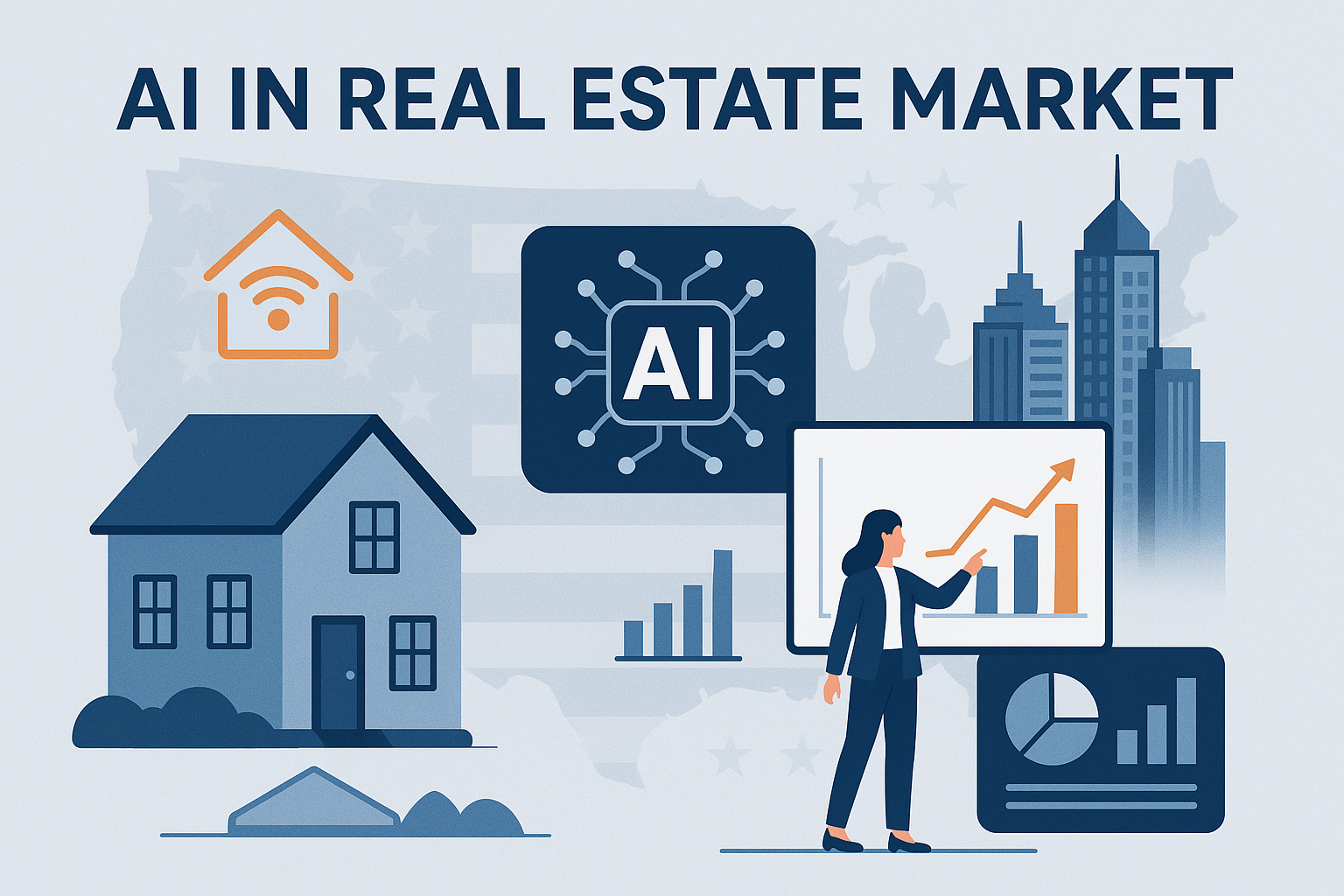
AI in Real Estate Market: Transforming Property Buying and Selling in 2025
Artificial Intelligence (AI) is rapidly reshaping the real estate market in the United States. From smarter property searches to automated valuations and predictive analytics, AI is revolutionizing how buyers, sellers, and agents interact with the property market. In this comprehensive guide, we’ll explore how AI in real estate market is changing the industry in 2025, the top AI tools, benefits, challenges, and what the future holds.
How AI Is Revolutionizing the Real Estate Market in 2025
AI is no longer a futuristic concept—it’s a present-day reality in the U.S. real estate market. Here’s how AI is making waves:
Smarter Property Search and Recommendations
AI-powered platforms analyze user preferences, search history, and market trends to deliver highly personalized property recommendations. 🏡
Automated Valuation Models (AVMs)
AI-driven AVMs use big data and machine learning to estimate property values with greater accuracy than traditional methods. This helps buyers and sellers make informed decisions.
Predictive Analytics for Market Trends
AI algorithms can forecast market trends, price fluctuations, and demand patterns, enabling investors and agents to strategize effectively.
Virtual Tours and Chatbots
AI enables immersive virtual tours and intelligent chatbots that provide instant responses to buyer inquiries, enhancing the customer experience.
TIP: Leverage AI-powered chatbots on your real estate website to provide 24/7 customer support and capture more leads!
Top 10 AI Tools Transforming the U.S. Real Estate Market in 2025
Here are the leading AI tools and platforms making a significant impact in the real estate sector:
- Zillow AI
- Redfin AI
- Compass AI
- Realtor.com AI
- Opendoor AI
- HouseCanary
- REX AI
- Roof AI
- LocalizeOS
- Restb.ai
Side-by-Side Comparison Table
| Rank | AI Tool | Key Feature | Best For | Pricing Model |
|---|---|---|---|---|
| 1 | Zillow AI | Predictive home values | Buyers/Sellers | Freemium |
| 2 | Redfin AI | Personalized search | Buyers/Agents | Free |
| 3 | Compass AI | Market insights | Agents/Brokers | Subscription |
| 4 | Realtor.com AI | Automated recommendations | Buyers/Renters | Free |
| 5 | Opendoor AI | Instant offers | Sellers | Transaction-based |
| 6 | HouseCanary | AVMs & analytics | Investors | Subscription |
| 7 | REX AI | Automated marketing | Sellers/Agents | Commission-based |
| 8 | Roof AI | Lead qualification | Agencies | Subscription |
| 9 | LocalizeOS | Buyer engagement | Agents | Subscription |
| 10 | Restb.ai | Image recognition | Listing platforms | API-based |
Key Benefits of AI in the Real Estate Market
AI offers a range of advantages for all stakeholders in the real estate industry:
- 📈 Enhanced Decision-Making: AI provides data-driven insights, reducing guesswork for buyers, sellers, and investors.
- 🕒 Time Savings: Automated processes like virtual tours, chatbots, and document analysis streamline transactions.
- 💰 Cost Efficiency: AI reduces operational costs by automating repetitive tasks and improving marketing ROI.
- 🤝 Improved Customer Experience: Personalized recommendations and instant support lead to higher satisfaction.
- 🔍 Greater Transparency: AI-driven analytics offer clear, unbiased property valuations and market forecasts.
Challenges and Limitations of AI in Real Estate
Despite its benefits, AI in the real estate market faces several challenges:
- 🛑 Data Privacy Concerns: Handling sensitive client data requires robust security measures.
- ⚖️ Algorithm Bias: AI models can reflect biases present in historical data, impacting fairness.
- 🏗️ Integration Complexity: Merging AI with legacy systems can be technically challenging for agencies.
- 👩💼 Human Touch: Some clients still prefer personal interactions over automated solutions.
TIP: Combine AI tools with human expertise to deliver a balanced and trustworthy real estate experience!
The Future of AI in the U.S. Real Estate Market
Looking ahead to 2025 and beyond, AI is expected to further transform the real estate landscape:
- Hyper-Personalization: AI will deliver even more tailored property matches and investment opportunities.
- Blockchain Integration: AI and blockchain together will streamline transactions and enhance security.
- Smart Contracts: Automated, AI-driven contracts will reduce paperwork and speed up closings.
- Sustainability Insights: AI will help identify eco-friendly properties and predict long-term value based on environmental factors.
Conclusion
AI in real estate market is fundamentally changing how properties are bought, sold, and managed in the United States. In 2025, AI-driven tools are empowering buyers, sellers, agents, and investors with smarter insights, faster transactions, and enhanced customer experiences. While challenges like data privacy and algorithmic bias remain, the benefits of AI—such as improved decision-making, cost savings, and greater transparency—are undeniable. As AI technology continues to evolve, embracing its capabilities will be essential for anyone looking to thrive in the modern real estate market. The future of real estate is intelligent, efficient, and customer-centric—powered by AI.